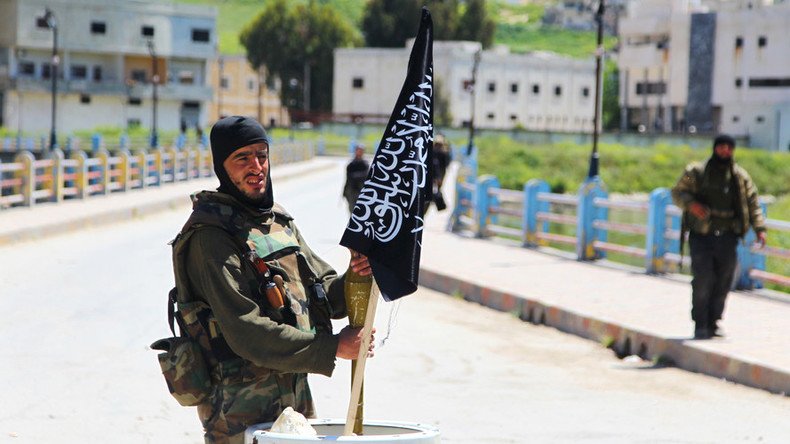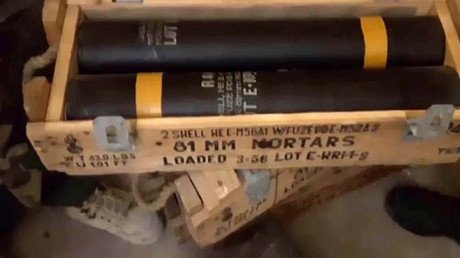‘Many weapons that fall into hands of extremist groups in Syria are Western-made’

We know that many weapons that were supplied to so-called moderate groups by the US have been handed to more extreme rebel groups, such as al-Nusrah, says Charles Shoebridge, former army officer, Scotland Yard detective and counter-terrorism intelligence officer.
Video footage has emerged allegedly showing a cache of weapons - including mortars, anti-tank missiles and grenades - being uncovered, along with Western (mostly US) manufactured weapons and ammunition in territories abandoned by terrorists in the strategic Syrian town of Aleppo.
The video appeared online Thursday and purported to show the discovery of western arms and ammunition in a house in Aleppo’s eastern Bani Zaid district. The majority of the weapons appear to be of US origin. They include US-made anti-tank missiles system (TOW 2A), American UN0181 missiles, as well as US-made 81mm mortars and ammunition.
Some of the crates holding the weapons are labeled with the marking ‘USA’.
RT: Reports and videos emerge apparently showing discovered storage of Western-made weapons. What do you make of it?
Charles Shoebridge: I’ve looked at this video in some detail, and… there doesn’t appear to be anything to suggest it is not genuine. It would be, if genuine, consistent with what would is already known and suspected for some time in respect to the supply of relatively heavy weaponry to Syria’s rebels. For example, the United States has openly announced in the last year or so that it is supplying antitank missiles of a type that appear to be in this video TOW missiles openly to what it calls carefully selected moderate rebel groups. We know that many of those groups have turned out to be, and were in fact know at the time to be, indeed far from moderate and very Islamist in nature. We also know that many of the weapons that were handed over to so-called moderate groups by the United States have been handed to either more extreme rebel groups, such as al-Nusrah… or have had them taken from them. Or perhaps have sold them to those groups. It’s not a surprise. This video is further confirmation that these weapons have ended up in the hands, it would appear, of extreme Syrian rebels – as was predicted from the start.
RT: How could the weapons got there?
CS: It could have been at any time that these weapons were provided. After all, it’s only relatively recently that the United States has been openly saying it’s supplying these so-called moderate rebels with weaponry. From the start of the Syrian conflict, it’s been clear that the United States, the UK and perhaps others have been covertly supplying rebels with, it must be said, not a lot of scrutiny as to where these weapons were ending up via certain back routes methods. One of those that was identified fairly early on in the Syrian conflict was the routes of getting weapons into Syria via the former Yugoslavia. And it is notable that some of these weapons, and the boxes that contain these weapons, do contain labels such as, ‘made in Yugoslavia.’ That gives us an idea, first of all, of the route that these weapons have taken, but also to the age of some of this weaponry… Much of it appears to have been manufactured in the West, specifically in the United States.
It could also have come via Saudi Arabia, which in the last two or three years have taken on very large orders of TOW weapons and other heavy weapons from the United States. Saudi Arabia is a major purchaser of Western weapons and of course Saudi Arabia is one of the foremost supporters, funders and suppliers of these extreme rebel groups in Syria.
RT: Russian monitoring center has claimed that the U.S.-backed group has conducted recent chemical attacks in Syria. Are we going to see America changing its stance on the moderate opposition?
CS: Of course it’s difficult to say what the American stance will be simply because it’s very difficult to even say what the American stance is or has been. US foreign policy isn’t a homogenous, shall we say, consistent beast. It’s the subject of many different pressure groups, many strands of policy, whether from State Department, the CIA, the military, as well as from lobbyists such as Saudi Arabia, Israel, and many, many more, including the military arms industry. All have an input into what US policy will be…
What’s important for the US, or parts of US policy making machinery is to keep pressure on [Syrian President Bashar] Assad, keep the country destabilized, keep Syria, some would argue, as ever becoming a viable threat again to countries such as Israel, and being a foreign supporter of countries such as Iran, which many in the US policy making machinery still see as an enemy, and now into that mix is Russia too.
The statements, views and opinions expressed in this column are solely those of the author and do not necessarily represent those of RT.













